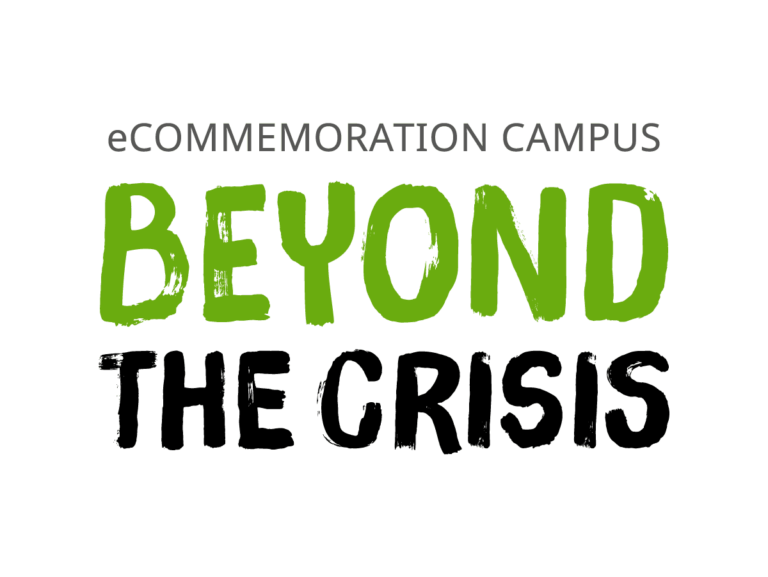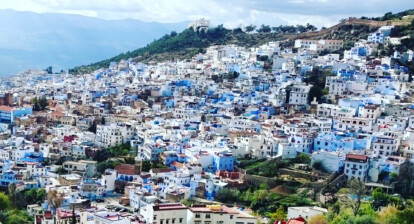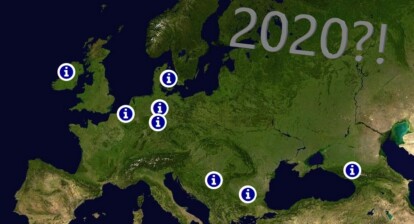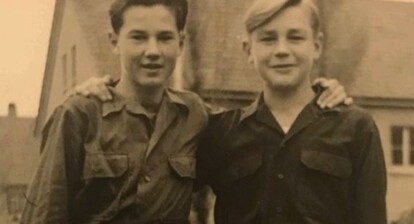The stories of ANA, OSIRIS, JADIYETU AND LAURE
The Threads of Resilience
How to endure a crisis? How to stay strong when life is tangled? Four women, four countries, four stories.
What they have in common: They have taken lose strings to create something new. Because anything you've dreamed of is possible to realize from the moment you decide to do it.
What they have in common: They have taken lose strings to create something new. Because anything you've dreamed of is possible to realize from the moment you decide to do it.
By Gara, participant of the eCommemoration Campus 2020
Ana – Spain
"We didn't know how repressed we were until we started to be free."
Inspired by the hope for her daughter
Ana was born in Valleseco in Gran Canary, Spain in 1947 during Francisco Franco's dictatorship. After Franco's coup in 1936 and a long civil war he remained in power until 1975. In Ana's family of ten people, her father was a dairyman and her mother kept the house in order. Women met to wash and sew clothes.
Ana considered herself privileged because she lived in a large house with animals and an iron stove. In school, the children sang "Cara al sol" (a hymn associated with Franco's dictatorship). Religion was important and the expression of political ideas were forbidden. For the young Ana it seemed normal that certain neighbours were hiding, missing or dead.
Ana considered herself privileged because she lived in a large house with animals and an iron stove. In school, the children sang "Cara al sol" (a hymn associated with Franco's dictatorship). Religion was important and the expression of political ideas were forbidden. For the young Ana it seemed normal that certain neighbours were hiding, missing or dead.

"I didn't mind living in a smaller house if it meant that my children would have the opportunity to study."
No school for the girls
At the age of 12, Ana stopped attending school to work in the house and to care for her family while her brothers were still allowed to attend secondary school. But Ana always wanted to study. 33 years later she returned to school and passed her final exams being 45 years old. Ana learnt from her own problems and decided that "if I ever have a daughter I
want her to be able to study and to be independent".
When she was 21, Ana married and had two children. She started to help her brother and her husband in a grocery shop, working 17 hours a day. Ana moved to Las Palmas with her family: "I didn't mind living in a smaller house if it meant that my children would have the opportunity to study."
At the age of 12, Ana stopped attending school to work in the house and to care for her family while her brothers were still allowed to attend secondary school. But Ana always wanted to study. 33 years later she returned to school and passed her final exams being 45 years old. Ana learnt from her own problems and decided that "if I ever have a daughter I
want her to be able to study and to be independent".
When she was 21, Ana married and had two children. She started to help her brother and her husband in a grocery shop, working 17 hours a day. Ana moved to Las Palmas with her family: "I didn't mind living in a smaller house if it meant that my children would have the opportunity to study."
Today, Ana is not entitled to a state pension although she has worked for 25 years. But she feels happy and fulfilled because her daughter has been able to complete her studies and now has a stable job. This is what Ana wants for her grandchildren, too: to be able to study and progress.
Osiris – Colombia
"We can't change it with wars, but with conscience"
Driven by a fighter's motivation
Osiris was born in Barrancabermeja, Colombia in 1959. She formed part of an indigenous family of 14 brothers and sisters. Her childhood was lovely. When she was a young girl, she always got up at 4:30 a.m. in the morning to work and help her family before school.
When Osiris was a teenager, her brother was arrested and tortured. The family's house got militarized. For her, these consequences of the conflict in Colombia meant the loss of happiness and innocence: "You see life for what it is."
However, Osiris studied social work. She started to understand things from the past and to take a stance, asking herself, "why do women have to fight for equality?". The question kept preying on her mind – and motivated her to join the feminist group at university.
When Osiris was a teenager, her brother was arrested and tortured. The family's house got militarized. For her, these consequences of the conflict in Colombia meant the loss of happiness and innocence: "You see life for what it is."
However, Osiris studied social work. She started to understand things from the past and to take a stance, asking herself, "why do women have to fight for equality?". The question kept preying on her mind – and motivated her to join the feminist group at university.

Strongly affected by her brother's suffering, Osiris started to work for several associations with the aim to defend the victims of political violence. Shortly afterwards, she became the director of the regional corporation for the defence of human rights. Controlling the observance of human rights in her region and report eventual infringements to the state on an international level belonged to her daily routine.
In the meantime, the tension of the conflict was growing until she started to receive threats being addressed to her and her family. Finally, in 1998, Osiris had to leave her home country and request political asylum.
Despite the desperation that she feels when she sees how fragile the moral and ethical conscience is in Colombia, where violence is being normalised, Osiris always meets people who keep fighting. Her hope is that people will realize that we don't need much but the most fundamental to survive: "We live in a system which is falling apart and we cannot change it with wars, but with our conscience."
In the meantime, the tension of the conflict was growing until she started to receive threats being addressed to her and her family. Finally, in 1998, Osiris had to leave her home country and request political asylum.
Despite the desperation that she feels when she sees how fragile the moral and ethical conscience is in Colombia, where violence is being normalised, Osiris always meets people who keep fighting. Her hope is that people will realize that we don't need much but the most fundamental to survive: "We live in a system which is falling apart and we cannot change it with wars, but with our conscience."
Jadiyetu – Sahara
"This is an unjust world where power prevails, and not the bravery."
Justice and courage in a diplomat's heart
Jadiyetu was born in Dahkla (Villa Cisneros) in 1959, as a child of a Saharaui family. Back then, Western Sahara was a Spanish colony. Her childhood was calm, life was peaceful under the Spanish colonists. Jadiyetu started her studies and moved to the city of El Aaiún in the north.
In 1975, when she was 16 years old, Spain withdrew from Western Sahara; Morocco and Mauritania took control of the territory.
"It was like a treason for us" Jadiyetu remembers. Morocco's army broke into houses, arrested people and even killed them, she says. Saharauis like Jadiyetu and her family had to flee to the desert in the east. There, they took shelter in a refugee camp, where Jadiyetu helped teaching children and distributing food supplies for 20 years. Ever since, she has felt a terrible injustice that her house had been taken and nobody cared: "This is an unjust world where power prevails, not bravery".
In 1975, when she was 16 years old, Spain withdrew from Western Sahara; Morocco and Mauritania took control of the territory.
"It was like a treason for us" Jadiyetu remembers. Morocco's army broke into houses, arrested people and even killed them, she says. Saharauis like Jadiyetu and her family had to flee to the desert in the east. There, they took shelter in a refugee camp, where Jadiyetu helped teaching children and distributing food supplies for 20 years. Ever since, she has felt a terrible injustice that her house had been taken and nobody cared: "This is an unjust world where power prevails, not bravery".
More information about Western Sahara's Conflict
Western Sahara is an unrecognised state in the North West of Africa. For almost 100 years it had been a Spanish colony – until 1975, when agreements on the decolonisation were signed in Madrid, resulting in the Spanish withdrawal. But Western Sahara didn't gain independence. Instead, it was occupied by Morocco and Mauritania.
In 1979 Mauritania withdrew from the Western Saharan territory but Morocco continues to occupy it to the present day. With one exception:The self-proclaimed Saharawi Arabic Democratic Republic is controlled by the Polisario Front, a liberation movement which aims to free the Western Sahara and claim independence from Morocco. The two parts of the country are divided by a wall.
Source: Central Intelligence Agency
In 1979 Mauritania withdrew from the Western Saharan territory but Morocco continues to occupy it to the present day. With one exception:The self-proclaimed Saharawi Arabic Democratic Republic is controlled by the Polisario Front, a liberation movement which aims to free the Western Sahara and claim independence from Morocco. The two parts of the country are divided by a wall.
Source: Central Intelligence Agency

The territory Western Sahara ist today occupied by Morocco.
Today, she is a member of the "National Union of Sahrawi Women" which offers information about the conflict from a woman's perspective, creating bonds emphasizing the importance of women's rights.
Jadiyetu works as a diplomat for Western Sahara. She regularly joins international conferences and visits countries to raise awareness of the conflict. Her hope is "to fight against injustice, to unite my family".
Jadiyetu works as a diplomat for Western Sahara. She regularly joins international conferences and visits countries to raise awareness of the conflict. Her hope is "to fight against injustice, to unite my family".
Laure – France
"What happened is not what they have told us"
Convinced of the power of history
Laure's parents were two Spanish Republicans who fled from the Spanish Civil War. Her mother was eight months pregnant and had to walk from Barcelona to Bordeaux, France – a distance of 600 kilometers.
It was thanks to her father's French nationality that her family could cross the border easily. In the meantime, many Spanish were held captive on a French beach guarded by the police. Shortly after the family's arrival, Laure was born on February 7th, 1939.
It was thanks to her father's French nationality that her family could cross the border easily. In the meantime, many Spanish were held captive on a French beach guarded by the police. Shortly after the family's arrival, Laure was born on February 7th, 1939.

Few months after her birth, World War II started and her father was sent to the front to join the French Resistance. Little Laure lived in Bordeaux which was occupied by the Nazis. She didn't suffer from food shortages or hunger because her mother and her aunt were dressmakers who exchanged clothes for food.
Although she was a young child, Laure still remembers the sound of the sirens announcing an air attack, how people forged rationing cards and the sight of dead bodies: "I was a 3 years old girl, but history makes you an old woman".
Today, Laure is 81 years old and she is convinced that personal history is important in order to remember the forgotten people, because "what happened is not what they have told us". To share her memories with future generations, Laure has written several books about her experiences during the Spanish Civil War and about the history of Bordeaux. Her hope is that history will be known and recognised. To show: "Life is a fight."
Although she was a young child, Laure still remembers the sound of the sirens announcing an air attack, how people forged rationing cards and the sight of dead bodies: "I was a 3 years old girl, but history makes you an old woman".
Today, Laure is 81 years old and she is convinced that personal history is important in order to remember the forgotten people, because "what happened is not what they have told us". To share her memories with future generations, Laure has written several books about her experiences during the Spanish Civil War and about the history of Bordeaux. Her hope is that history will be known and recognised. To show: "Life is a fight."
Acknowledgments and credits: for translations from Hassaniya and English: Samuel Marsden and Bachir Ahmed Aomar. All photos and videos are private.






